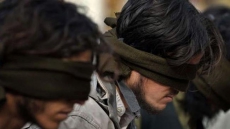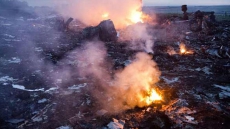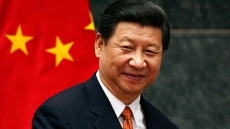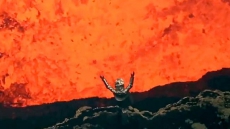In a dramatic shift, U.S. President Barack Obama has opened a new front in the fight against Islamic rebels, promising to lead an international coalition that will attack them on Syrian turf.
He used a rare prime-time speech to lay out a program that would have been unthinkable until recently: a multi-country fight in the Middle East, involving American airstrikes and special forces in Iraq and now Syria, as part of a broad counter-terrorism plan.
"We will degrade, and ultimately destroy, ISIL through a comprehensive and sustained counter-terrorism strategy," Obama said.
"We will hunt down terrorists who threaten our country wherever they are. That means I will not hesitate to take action against ISIL in Syria, as well as Iraq. This is a core principle of my presidency: If you threaten America, you will find no safe haven."
Obama carefully avoided calling it a war.
He added a familiar caveat, as he has at every step of the way in recent weeks as American military involvement in the region steadily increased, promising once again that combat troops won't be going back in: "We will not get dragged into another ground war in Iraq."
That dual position — yes to airstrikes, no to a ground war — appears to be in line with American public opinion.
American attitudes have hardened lately, with an increased willingness to launch strikes against the Islamic State of Iraq and the Levant — first in Iraq, and now in Syria. But polls also suggest that they still staunchly oppose another ground war, after a decade of bloody and multi-trillion dollar foreign conflicts. Canada has contributed to the ISIL fight with humanitarian airlifts and the promise of special forces in Iraq.
Wednesday's speech was the latest step down an improbable path for a presidency that sprang from an anti-war platform and received a Nobel Peace Prize in its infancy.
The catalyst appeared to be brutal images from the Islamic rebellion that has gobbled up territory in eastern Syria and western Iraq, notably two videos of American journalists being beheaded.
American public opinion has shifted, even from just a few weeks ago.
An NBC/Wall Street Journal poll said 61 per cent declared attacking ISIL in Iraq and Syria would be in the national interest, versus a minuscule 13 per cent who disagreed. A year ago, respondents answered with a deafening No when asked whether the U.S. should attack Syria's Assad regime — only 21 per cent supported action in Syria in August 2013.

After avoiding participation in the Syrian conflict, Obama had briefly flirted with airstrikes last year upon evidence that the regime had used chemical weapons. But he was shouted down by American public opinion back then.
Even Wednesday, there was a strong word of caution from a surprising quarter: the Canadian speechwriter who penned George W. Bush's speeches a decade ago as he prepared to invade Iraq. David Frum, the author of the "axis of evil" line, said he's haunted by the decision to launch a war under false pretences and said there's not a single day that he doesn't think about it.
To illustrate his case, he pointed to the 180-degree shift from 2013. Obama has not only switched his main target in Syria, from the regime to the rebels, but he's also gone from insisting back then on the need to get congressional approval to now insisting he can act without it.
"It seems like only last year that this president was asking Congress for authority to bomb Assad. Twelve months later, he will bomb Assad's enemies," Frum wrote in the Atlantic.
"Why does bombing one side of a war require congressional permission, while bombing the other side does not? The administration doesn't answer, because nobody is asking. Something must be done! This is something! Let's do this!... It's a reaction: an emotional reaction, without purpose, without strategy, and without any plausible — or even articulated — definition of success."
But Frum may be in the minority.
The ISIL threat is already being felt in the early race for the 2016 presidential nominations. The most prominent war-skeptic in the Republican party, Sen. Rand Paul, has made more hawkish noises lately.
Canada's ambassador to the U.S. acknowledged the dilemma Obama faced in Syria.

"Canada didn't arm moderates in Syria a couple of years ago because we didn't know who they were. And now we find that the people who were armed last year, all the arms are owned by ISIS in Syria," Gary Doer said during an energy-industry event in Calgary.
"So these are not easy questions for the president."
Hours before the speech, Obama convened a meeting with more than a dozen members of his national-security team at the White House. He also spoke by phone with King Abdallah Abd al Aziz of Saudi Arabia.
The U.S. has pressured regional allies to step up their own role in fighting ISIL, and Obama has expressed exasperation at the notion that Americans should be expected to do all the heavy lifting.





